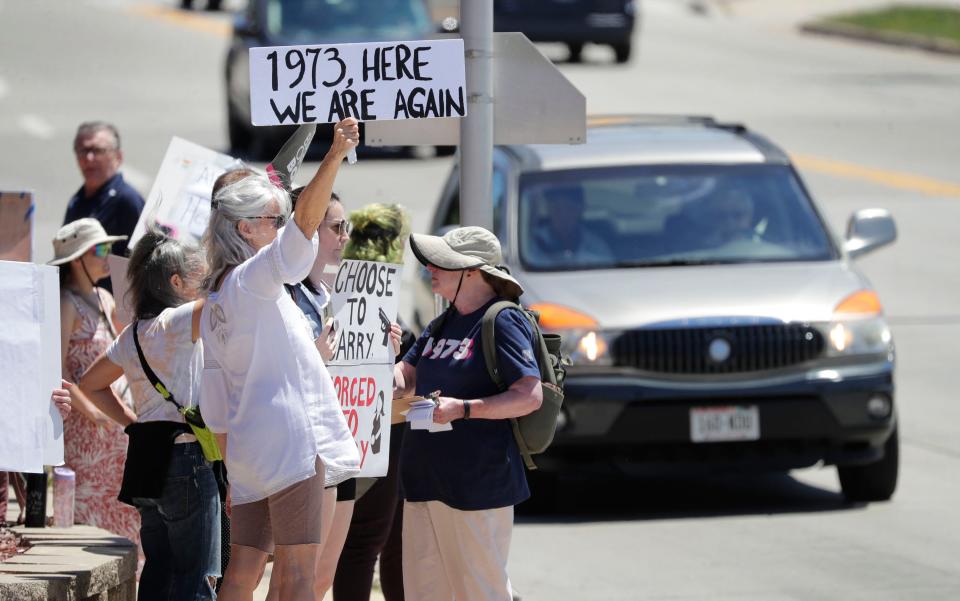Opinion: With Roe overturned, Wisconsin prosecutors can exercise discretion on abortion just as they do on adultery
The U.S. Supreme Court’s recent decision overruling Roe v. Wade and leaving the issue of how and whether to prohibit abortion to the states has put Wisconsin’s 1849 law making abortion a felony back into the spotlight.
Section 940.04 of the Wisconsin Statutes — the 1849 law — generally makes it a felony for “[a]ny person, other than the mother” to “intentionally destroy the life of an unborn child” unless the abortion is performed by a physician at a licensed maternity hospital and is necessary to save the life of the pregnant woman. Under the law, an "unborn child" is defined as a “human being from the time of conception until it is born alive.”
Another Wisconsin statute on abortion, Section 940.15, was enacted in 1985, more than a decade after the Roe v. Wade decision. The 1985 law makes it a felony to perform an abortion after the fetus has reached the point of viability, unless abortion is necessary to preserve the life or health of the woman.
The term “viability” in the 1985 law is defined as the “stage of fetal development when, in the medical judgment of the attending physician based on the particular facts of the case before him or her, there is a reasonable likelihood of sustained survival of the fetus outside the womb, with or without artificial support.”
There are substantial differences between Wisconsin’s 1849 law and its 1985 law on abortion. The laws appear to be in substantial conflict given, for example, that the former law prohibits abortion “from the time of conception” while the later law prohibits abortion only “after the fetus or unborn child reaches viability.”

Wisconsin’s attorney general has filed a lawsuit challenging the 1849 law arguing, in part, that the 1985 law on abortion supersedes the 1849 law.
In a 1994 case, the Wisconsin Supreme Court found that the 1985 law did not impliedly repeal one particular provision of the 1849 law relating to an “unborn quick child” or what the court labeled a “feticide statute.”
But the Wisconsin Supreme Court also indicated in the 1994 decision that a provision of the 1849 law “cannot be used to charge for a consensual abortive type of procedure” and that to do so “would be inconsistent” with the 1985 law.
The fate of Wisconsin’s abortion laws will ultimately be resolved in court through what are surely to be intense legal battles over this contentious issue.
A July memo by the non-partisan Wisconsin Legislative Council concerning the current status of abortion law in Wisconsin since the overruling of Roe v. Wade, summarized challenges to the 1849 abortion law and noted that “district attorneys have wide discretion in determining whether to prosecute violations of the law, which may result in varying degrees of enforcement throughout the state.”
While the fate of Wisconsin’s varying abortion laws remains unclear, some Wisconsin prosecutors have taken different positions on whether they will be seeking to prosecute people for abortion.
Some prosecutors have indicated they are using their discretion not to prosecute people for abortion for a variety of reasons, including limited law enforcement resources.
Other prosecutors have essentially argued that “the law is the law,” so to speak, and that they will actively prosecute people for abortion.
Putting aside the argument that Wisconsin’s laws on abortion are seemingly in conflict, even if the laws on abortion were crystal clear, prosecutors still exercise enormous discretion in determining whether to charge people with crimes. There are innumerable violations of law every day that go unenforced and unprosecuted, and there are a plethora of reasons for that — sometimes law violations go unprosecuted because of a lack of law enforcement or prosecutorial resources or because a prosecutor determines, in his or her discretion and for a whole host of reasons, that a person ought not be prosecuted.
More: Sheboygan rally draws hundreds after Roe overturned
One example of a law that is rarely (if ever) prosecuted in modern times is Wisconsin’s adultery felony. In Wisconsin, adultery is a felony punishable by up to 3-1/2 years in prison and a $10,000 fine, or both.
Adultery, as defined by Wisconsin law, is committed by “[a] married person who has sexual intercourse with a person not the married person’s spouse” or “[a] person who has sexual intercourse with a person who is married to another.”
In the United States, adultery is, unfortunately, fairly common. While the numbers vary, studies tragically show alarmingly high rates of infidelity among married couples.
But Wisconsin prosecutors virtually never prosecute people for the felony crime of adultery, even though they could do so. It is a law that was passed by the legislature and is still “on the books,” so to speak. And, unlike the abortion laws in Wisconsin that are being challenged and seemingly conflict, the law on adultery is quite clear.

This is not, in any way, to advocate for prosecutors to run around charging countless people with the felony crime of adultery in Wisconsin. While adultery is morally wrong, prosecutors surely have far more important matters to worry about than prosecuting people for adultery. Law enforcement resources would not be best used if officers were tasked with investigating the private sexual activities of consenting adults for being unfaithful to their spouses.
But the point is that prosecutors’ decisions not to ask law enforcement to investigate people for adultery, nor to prosecute people for adultery, is a matter of prosecutorial discretion. It is also a decision by prosecutors to effectively not enforce a Wisconsin law that is on the books, is clear and has not been repealed.
With all the controversy surrounding Wisconsin’s abortion laws, prosecutors who are arguing, in essence, that “the law is the law” and they will enforce the abortion laws, are almost certainly the same prosecutors who have chosen for years not to prosecute people for committing Wisconsin’s adultery felony, and many other laws as well.
Casey Hoff is a criminal defense attorney, based in Sheboygan.
This article originally appeared on Sheboygan Press: Roe v. Wade and Wisconsin abortion laws: Prosecutors have discretion

